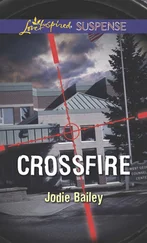“Did you find any corroborative points that helped you diagnose the dissociative state Peter went into on March sixth?” Jordan asked.
“Yes. Although the police investigation stated that Peter had created a list of target victims, there were far more people shot who were not on the list…who were, in fact, students he didn’t even know by name.”
“Why is that important?”
“Because it tells me that at the time he was shooting, he wasn’t targeting individual students. He was merely going through the motions.”
“Thank you, Doctor,” Jordan said, and he nodded to Diana.
She looked at the psychiatrist. “Peter told you he had been humiliated in the cafeteria,” she said. “Did he mention any other specific places?”
“The playground. The school bus. The boys’ bathroom and the locker room.”
“When Peter started shooting at Sterling High, did he go into the principal’s office?”
“Not that I’m aware of.”
“How about the library?”
“No.”
“The staff lounge?”
Dr. Wah shook his head. “No.”
“The art studio?”
“I don’t believe so.”
“In fact, Peter went from the cafeteria, to the bathrooms, to the gym, to the locker room. He went methodically from one venue where he’d been bullied to the next, right?”
“It seems so.”
“You said he was going through the motions, Doctor,” Diana said. “But wouldn’t you call that a plan?”
When Peter got back to the jail that night, the detention officer who took him to his cell handed him a letter. “You missed mail call,” he said, and Peter couldn’t speak, so unaccustomed was he to that concentrated a dose of kindness.
He sat down with his back to the wall on the lower bunk and surveyed the envelope. He was a little nervous, now, about mail-he had been since Jordan reamed him for talking to that reporter. But this envelope wasn’t typed, like that one had been. This letter was handwritten, with little puffy circles floating over the i’s like clouds.
He ripped it open and unfolded the letter inside. It smelled like oranges.
Dear Peter,
You don’t know me by name, but I was number 9. That’s how I left the school, with a big magic marker label on my forehead. You tried to kill me.
I am not at your trial, so don’t try to find me in the crowd. I couldn’t stand being in that town anymore, so my parents moved a month ago. I start school in a week here in Minnesota, and already people have heard about me. They only know me as a victim from Sterling High. I don’t have interests, I don’t have a personality, I don’t even have a history, except the one you gave me.
I had a 4.0 average but I don’t care very much about grades anymore. What’s the point. I used to have all these dreams, but now I don’t know if I’ll go to college, since I still can’t sleep through the night. I can’t deal with people who sneak up behind me either, or doors that slam really loud, or fireworks. I’ve been in therapy long enough to tell you one thing: I’m never going to set foot in Sterling again.
You shot me in the back. The doctors said I was lucky-that if I’d sneezed or turned to look at you I would be in a wheelchair now. Instead, I just have to deal with the people who stare when I forget and put on a tank top-anyone can see the scars from the bullet and the chest tubes and the stitches. I don’t care-they used to stare at the zits on my face; now they just have another place to focus their attention.
I’ve thought about you a lot. I think you should go to jail. It’s fair, and this wasn’t, and there’s a kind of balance in that.
I was in your French class, did you know that? I sat in the row by the window, second from the back. You always seemed sort of mysterious, and I liked your smile.
I would have liked to be your friend.
Sincerely,
Angela Phlug
Peter folded the letter and slipped it inside his pillowcase. Ten minutes later, he took it out again. He read it all night long, over and over, until the sun rose; until he did not need to see the words to recite it by heart.
Lacy had dressed for her son. Although it was nearly eighty-five degrees outside, she was wearing a sweater she had dug out of a box in the attic, a pink angora one that Peter had liked to stroke like a kitten when he was tiny. Around her wrist was a bracelet Peter had made her in fourth grade by rolling up tiny bits of magazines into splashy colored beads. She had on a gray patterned skirt that Peter had laughed at once, saying it looked like a computer’s motherboard, and wasn’t that sort of fitting. And her hair was braided neatly, because she remembered how the tail had brushed Peter’s face the last time she’d kissed him good night.
She’d made a promise to herself. No matter how hard this got, no matter how much she had to sob her way through the questions, she would not take her eyes off Peter. He would be, she decided, like the pictures of white beaches that birthing mothers sometimes brought in as a focal point. His face would force her to concentrate, even though her pulse was skittish and her heart was off a beat; she would show Peter that there was still someone steadfastly watching over him.
As Jordan McAfee called her to the stand, the strangest thing happened. She walked in with the bailiff, but instead of marching toward the tiny wooden balcony where the witness was to sit, her body moved of its own accord in the other direction. Diana Leven knew where she was heading before Lacy did herself-she stood up to object, but then decided against it. Lacy’s step was quick, her arms flat at her sides, until she was positioned in front of the defense table. She knelt down beside Peter, so that his face was the only thing she could see in her range of vision. Then she reached out with her left hand and she touched his face.
His skin was still as smooth as a child’s, warm to the touch. When she cupped his cheek, his lashes fanned over her thumb. She had visited her son weekly in the jail, but there had always been a line between them. This-the feeling of him underneath her own hands, vital and real-was the kind of gift you had to take out of its box every now and then, hold aloft, marvel at, so you didn’t forget that it was still in your possession. Lacy remembered the moment Peter had first been placed in her arms, still slick with vernix and blood, his raw, red mouth round with a newborn’s cry, his arms and legs splayed in this suddenly infinite space. Leaning forward, she did now the same thing she’d done the first time she’d met her son: closed her eyes, winged a prayer, and kissed his forehead.
A bailiff touched her shoulder. “Ma’am,” he began.
Lacy shrugged him off and got to her feet. She walked to the witness box and unhooked the latch of the gate, let herself inside.
Jordan McAfee approached her, holding a box of Kleenex. He turned his back so that the jury could not see him speaking. “You okay?” he whispered. Lacy nodded, faced Peter, and offered up a smile like a sacrifice.
“Can you state your name for the record?” Jordan asked.
“Lacy Houghton.”
“Where do you live?”
“1616 Goldenrod Lane, Sterling, New Hampshire.”
“Who lives with you?”
“My husband, Lewis,” Lacy said. “And my son, Peter.”
“Do you have any other children, Ms. Houghton?”
“I had a son, Joseph, but he was killed by a drunk driver last year.”
“Can you tell us,” Jordan McAfee said, “when you first became aware that something had happened at Sterling High School on March sixth?”
“I was on call overnight at the hospital. I’m a midwife. After I had finished delivering a baby that morning. I went out to the nurses’ station, and they were all gathered around the radio. There had been an explosion at the high school.”
Читать дальше












